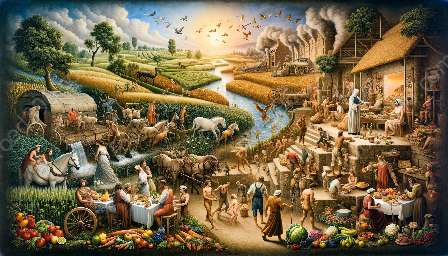Agriculture, the practice of cultivating and harvesting crops and raising animals for food, is one of the most significant developments in human history. The origins of agriculture can be traced back to the Neolithic revolution, a pivotal period that saw the transition from nomadic hunter-gatherer lifestyles to settled farming communities. This shift not only transformed the way humans interacted with their environment but also shaped the course of human civilization. In this topic cluster, we will explore the origins of agriculture, its historical developments in food production, and its profound impact on food culture and history.
The Neolithic Revolution
The Neolithic revolution, also known as the agricultural revolution, marked a crucial turning point in human history. It emerged around 10,000 BCE and took place in multiple regions across the world, including the Middle East, Asia, and the Americas. During this period, humans shifted from a nomadic lifestyle, relying on hunting and foraging for sustenance, to a more settled existence centered around agricultural practices.
One of the most significant advancements during the Neolithic revolution was the domestication of plants and animals. Early farmers began cultivating and breeding wild plants, such as wheat, barley, rice, and maize, as well as domesticating animals like cattle, sheep, and pigs. This deliberate manipulation and selection of species marked the beginning of agriculture as we know it today.
The Birth of Agriculture
The development of agriculture gave rise to the establishment of permanent settlements and the formation of complex societies. With a stable food supply, populations grew, allowing for the specialization of labor and the emergence of social hierarchies. As agricultural techniques advanced, so did the sophistication of farming practices, including irrigation, crop rotation, and the use of domesticated animals for labor.
Across different regions, unique agricultural practices and technologies emerged, each shaping the local food culture and traditions. For example, the ancient civilizations of Mesopotamia, Egypt, and the Indus Valley developed irrigation systems and implemented organized farming methods to support their growing populations.
Historical Developments in Food Production and Agriculture
Over time, agricultural innovations and technological advancements continued to revolutionize food production. The introduction of metal tools, such as plows and sickles, improved farming efficiency, while the domestication of new crops expanded agricultural diversity. The exchange of agricultural knowledge and crops through trade and migration further enriched food production practices around the world.
The spread of agriculture also led to the development of complex trade networks and the rise of urban centers. Agricultural surplus allowed for the specialization of crafts and trades beyond farming, giving birth to diverse food-related professions and industries. These developments laid the foundation for the interconnected global food systems that exist today.
The Impact of Agriculture on Food Culture and History
Agriculture not only transformed the way humans produced food but also profoundly influenced food culture and history. The cultivation of specific crops and the rearing of particular animals became deeply embedded in the culinary traditions and dietary habits of different societies.
Furthermore, the advent of agriculture enabled the development of culinary arts, food preservation techniques, and the creation of distinct regional cuisines. The domestication of plants and animals allowed for the creation of a wide range of food products, from bread and cheese to wine and beer, shaping the diverse culinary landscape we know today.
As agricultural societies prospered, they left behind archaeological evidence of their food practices, including agricultural tools, cooking vessels, and food storage facilities. These artifacts provide valuable insights into ancient food cultures and dietary patterns and contribute to our understanding of the interconnected history of food and human civilization.
Conclusion
The origins of agriculture revolutionized human societies and laid the groundwork for the development of food production and agricultural practices. This pivotal shift from hunter-gatherer lifestyles to settled farming communities shaped the course of human civilization and continues to impact food culture and history to this day. Understanding the origins of agriculture provides a compelling lens through which to explore the historical developments in food production and agriculture, as well as the rich tapestry of food culture and history that defines our global culinary heritage.

